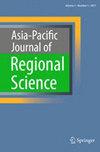Impact of climate and economic policy uncertainties on inflation in India: using the vector error correction model approach
Abstract
Economic policies are designed to address challenges in the economic environment and mitigate future associated risks and uncertainties. The present study addressed the impact of policy uncertainties such as climate policy uncertainty (CPU) and economic policy uncertainty (EPU) on price inflation in India. The data were sourced from the Reserve Bank of India and Policy Uncertainty databases from April 2004 to March 2024. Descriptive statistics and stationarity tests were conducted to analyze the characteristics of the variables. Johansen’s cointegration test assessed the long-term relationships among the regressors. The vector error correction model (VECM) and impulse response function (IRF) were used to evaluate long-run equilibrium dynamics and the responsiveness of inflation to policy uncertainties. The empirical outcomes specified a significant relationship between inflation and economic policy uncertainty, while climate policy uncertainty exhibited an insignificant positive effect on inflation. These findings suggest that policy uncertainties influence inflation and broader economic stability. The study emphasizes the importance of formulating coherent and stable economic policies to mitigate inflationary pressures and foster economic resilience.

 求助内容:
求助内容: 应助结果提醒方式:
应助结果提醒方式:


